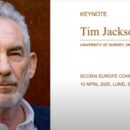
On 23 January 2020, the European Economic and Social Committee (EESC) overwhelmingly adopted an ‘own initiative opinion’ on the sustainable and inclusive ‘wellbeing economy’ that Europe needs. It called for a ‘new vision of prosperity for people and planet based on the principles of environmental sustainability, the right to a decent life and the protection of social values’.
CUSP Director Tim Jackson has worked closely with the EESC over the last year to help craft the opinion. He was appointed by the Committee as expert to the rapporteur early last year and took a lead role on drafting (and re-drafting) the opinion in the intervening months.
“I’m absolutely delighted by today’s vote,” said Prof Jackson. “It lays the foundations for a far-reaching transformation of Europe’s economic vision for the future.” The Committee highlighted that building the wellbeing economy must start by adopting ‘a precautionary approach in which macroeconomic stability does not depend on GDP growth’ and proposed the development of new indicators of economic performance and social progress.
Its detailed proposals include a review of the EU’s fiscal and monetary rules, an end to perverse subsidies and action ‘to address hyper-consumerism’ across Europe. It also proposed the adoption of a Living Standards Framework and the introduction of a Wellbeing Budget for the EU.
The plenary session made only one amendment to the draft document—noting that the newly appointed EC President, Ursula von der Leyen’s recent speech on a European Green Deal ‘opens up a window of hope for the EESC’s proposals included in the present opinion’. The amended opinion was adopted by 100 votes for and 8 against, with 9 abstentions.
Link
For further details, please see the EESC website. The full-text draft can be reached via eesc.europa.eu.
What are ‘opinions’?
From the EU Open Data website: “Under the terms of the treaties, the European Parliament, the Council and the Commission have a legal obligation to consult the European Economic and Social Committee (EESC) when they are passing new legislation on a wide range of issues. The EESC examines these proposals and draws up opinions based on agreements reached by members. In addition, the EESC adopts own-initiative opinions on topics members believe to be important for the interests of EU citizens. It also produces exploratory opinions, requested by EU law-makers when they want an overview of civil society’s views, and publishes information reports on topical issues. The EESC also develops ideas reflecting the demands of civil society on a project basis and carries out impact assessments to monitor the effect of EU legislation.”
This post first appeared on the CUSP website, 23 Jan 2020.






